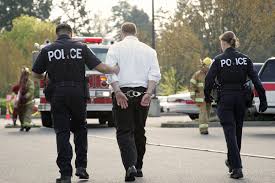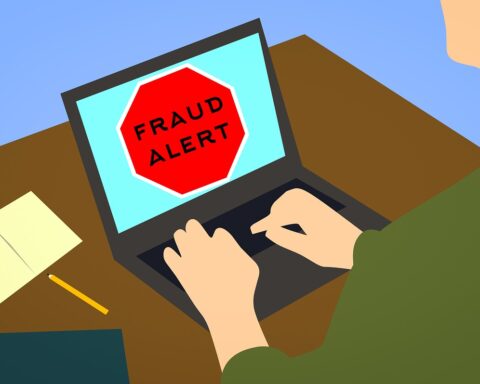(Disclaimer: The content of this article is for informational purposes only and not for the purpose of providing legal advice to any person. You should contact your own personal attorney to obtain advice with respect to any particular issue or problem. You should consult and KNOW the laws in your jurisdiction before taking or abstaining from any action related to a police stop or arrest. Reading this article and accessing any of the links contained in the article do not create an attorney-client relationship between the author and the reader. The opinions expressed in this article are the expressly and only the opinions of the author.)
You’ve been pulled over… or even worse… it appears you might be (or you have been) arrested for a crime. What should you do?
Don’t talk to Law Enforcement any more than you are legally required to.
The Fifth Amendment to the United States Constitution gives you the right to refuse to discuss a criminal matter with government officials. The Fifth Amendment states in pertinent part:
No person… shall be compelled in any criminal case to be a witness against himself, nor be deprived of life, liberty, or property, without due process of law…
Robert H. Jackson was the United States Solicitor General, United States Attorney General, and an Associate Justice of the United States Supreme Court. He is the only person in United States history to have held all three of those offices. Justice Jackson is remembered for his famous advice that:
any lawyer worth his salt will tell the suspect in no uncertain terms to make no statement to the police under any circumstances.
Here is why…
In Ohio v. Reiner, the United States Supreme Court stated:
… one of the Fifth Amendment’s basic functions is to protect innocent men… who otherwise might be ensnared by ambiguous circumstances… truthful responses of an innocent witness… may provide the government with incriminating evidence from the speaker’s own mouth.
You can accidentally say entirely innocent things to a law enforcement officer that might result in your being convicted of a crime that you didn’t commit (or of one that you did). Other than providing legally required information, you are better off not to discuss the incident for which you are being pulled over or arrested with any agent of the State UNTIL YOU HAVE CONSULTED WITH YOUR ATTORNEY.
 If we’re merely talking about a traffic stop, you should never admit you were speeding – you have just guaranteed a speeding conviction (unless you happen to have a very nice, reasonable officer, in which case the officer MIGHT give you a warning). You should never admit that you had a beer – you have just given the officer probable cause to make you get out of the car, take a breathalyzer test and perform the physical tests on the roadside. You have no duty to tell the officer where you’re coming from or where you’re going. You have no duty to consent to any search of your vehicle (And do NOT consent to such a search. Ever. If the officer actually believes he has probable cause to search your vehicle, he will order you to get out of the vehicle and he will do the search. Do not give him a basis for doing so. If you do, you have waived your Fourth Amendment right not to be searched.). If you say more than is required by law, you might say something that gives the officer probable cause to search your vehicle. If they search the vehicle, they might find something illegal (drugs, paraphernalia, etc…) that someone else accidentally left/dropped in your car days, weeks, or months before. Then you could find yourself charged with a crime that you did not commit.
If we’re merely talking about a traffic stop, you should never admit you were speeding – you have just guaranteed a speeding conviction (unless you happen to have a very nice, reasonable officer, in which case the officer MIGHT give you a warning). You should never admit that you had a beer – you have just given the officer probable cause to make you get out of the car, take a breathalyzer test and perform the physical tests on the roadside. You have no duty to tell the officer where you’re coming from or where you’re going. You have no duty to consent to any search of your vehicle (And do NOT consent to such a search. Ever. If the officer actually believes he has probable cause to search your vehicle, he will order you to get out of the vehicle and he will do the search. Do not give him a basis for doing so. If you do, you have waived your Fourth Amendment right not to be searched.). If you say more than is required by law, you might say something that gives the officer probable cause to search your vehicle. If they search the vehicle, they might find something illegal (drugs, paraphernalia, etc…) that someone else accidentally left/dropped in your car days, weeks, or months before. Then you could find yourself charged with a crime that you did not commit.
On the other hand, a traffic stop is not a murder investigation. The officer might let you off with a warning. Don’t talk anymore than necessary, but be courteous and respectful. But don’t get into conversations about whether you know what you did was wrong. There’s nothing wrong with saying something like, “Officer, I didn’t mean to do anything wrong. If I did violate the law, I’m sorry.”
Don’t talk to Law Enforcement any more than you are legally required to.
If we’re talking about a more serious case in which you have been or might be arrested – as you probably know, the law in the United States requires that an arresting officer read the suspect their “Miranda” rights when the suspect is arrested. Those rights include statements about several very important rights, arguably the two most important of which are:
You have the right to remain silent and refuse to answer questions.
Anything you say may be used against you in a court of law.
If the arresting officer believes you are guilty, there is literally nothing you can say to the officer to convince him that you’re not guilty… and there are an innumerable things you can say to the officer that will either: (1) result in your conviction of a crime which you may or may not have committed; or (2) result in reinforcing the officer’s belief that you are guilty, thereby causing you to be charged with a crime or charged with additional crimes.
Further, anything you say to the officer which might help your case cannot be used for you in court because it is hearsay evidence under Rule of Evidence 801 (Rule 801 allows statements to the police that HURT you case to be used against you, but does not allow statements that HELP your case to be used for you).
Don’t talk to Law Enforcement any more than you are legally required to.
On TV shows and in movies, you have probably heard law enforcement officers sat something to the effect of, “Come on, you don’t need an attorney… tell me what really happened and I’ll make sure things go easy for you and you get a light sentence.”
THIS IS ABSOLUTELY NOT TRUE. A law enforcement officer has little to no discretion over whether or not you are charged with a crime, has no authority over the prosecuting attorney concerning whether or not “things go easy for you” and has ZERO discretion over your sentencing. The officer does not control your fate. The Prosecutor, Judge and Jury do.
The only influence the officer has over whether you are charged with a crime and whether “things go easy for you” is expressing his opinion to the Prosecutor as to what the officer thinks should happen to you. The Prosecutor has complete discretion to charge you with a crime or not… and whether to continue prosecuting the case at all stage of the prosecution. The only influence the officer will have with the Judge is the officer’s testimony at trial. Obviously, if you resisted arrest and/or assaulted the officer, that’s going to result in additional charges and will probably have a negative effect on the Judge’s opinion of you.
But – and this is a BIG but – Judges and Prosecutors know and understand the law. They know that you are better off saying nothing. It is not likely that they will hold that against you. They may even respect you for understanding your rights and exercising them. They are not likely to be harder on you because you remained silent and waited for the advice of your attorney before saying anything.
Law enforcement officers are trained in interrogation techniques. You probably aren’t. Law enforcement officers are allowed to lie to you and tell you that they have evidence that you committed the crime – even though they don’t have that evidence. Law enforcement officers do this sort of thing every day for years or decades. You’re not going to outsmart them when it comes to answering their questions – those questions will be loaded and intended to get you to admit to something… anything… that will help them build a case against you.
There is no need to hurry and get your side of the story out. Wait, talk to your attorney and then decide what to do or say.
Don’t talk to Law Enforcement any more than you are legally required to.
I recommend that everyone watch the two videos linked below – especially if you doubt what I have discussed above. The first video is from a defense attorney/law professor at Regent University. The second video is the rebuttal from a career law enforcement officer who has interviewed 1000s of people. Both videos will take less than an hour of your time, both videos are interesting (even entertaining in some parts), and you will probably learn a number of things you weren’t aware of.
What’s really interesting is that the defense attorney/law professor and the police officer both agree completely and confirm what I have informed you of already – whether you are guilty or innocent, you should not ever talk to law enforcement officers about a criminal case before you consult with an attorney. If you watch the videos, you will note that the Police Officer even admits that he is allowed to lie to you about whether or not he has any evidence against you – and specifically says that suspects should not talk to him before consulting with their attorney.
Now to the religious problem… some Christians may be uncomfortable with taking the silent approach, feeling that being open and honest is the “Christian” way. Some Christians may believe that it is “wrong” or “sinful” to exercise one’s Constitutional rights. This is not, in fact, the case.
Jesus Christ took the “don’t talk to Law Enforcement” approach on multiple occasions when he was accused and arrested:
Luke 23:8-9
“Now when Herod saw Jesus he was very glad, having for a long time had a desire to see him, for he had had accounts of him, and was hoping to see some wonders done by him. And [Herod] put a great number of questions to [Jesus], but [Jesus] said nothing.”
Mark 14:60-61
“And the high priest got up in the middle of them, and said to Jesus, ‘Do you say nothing in answer? What is it which these say against you?’ But [Jesus] kept quiet and said nothing.”
Mark 15:2-5
“And Pilate put a question to [Jesus], Are you the King of the Jews? And [Jesus], answering, said to him, ‘You say so’. And the chief priests said a number of things against him. And Pilate again put a question, ‘Do you say nothing in answer? See how much evil they say you have done.’ But Jesus gave no more answers, so that Pilate was full of wonder.”
John 19:8-9
“When this saying came to Pilate’s ears his fear became greater; And he went again into the Praetorium and said to Jesus, ‘Where do you come from?’ But Jesus gave him no answer.”
Matthew 27:11-14
And Jesus was before the ruler, who put a question to him, ‘Are you the King of the Jews?’ And Jesus said to him, ‘You say so.’ But when the chief priests and those in authority made statements against [Jesus], he gave no answer. Then says Pilate to him, ‘Do you give no attention to what their witnesses say against you?’ And he gave him no answer, not even a word: so that the ruler was greatly surprised.”
Follow Jesus Christ’s example. Don’t talk to Law Enforcement any more than you are legally required to.
Further, Apostle Paul exercised his “Constitutional” rights as a Roman citizen on two different occasions. On one occasion, Paul and his friend Silas had been arrested, beaten in public, and put in jail without providing Paul the due process required under Roman law (i.e. beatings without hearing/conviction of crime, etc…). While Paul was still in jail, the following happened (Acts 16:35-38*):
“But when it was day, the authorities sent the police, saying, ‘Let these men go’. And the keeper said to Paul, ‘The authorities have given orders to let you go: come out now, and go in peace’. But Paul said to them, ‘They have given us who are Romans a public whipping without judging us, and have put us in prison. Will they now send us out secretly? No, truly, let them come themselves and take us out’. And the police gave an account of these words to the authorities, and they were full of fear on hearing that [Paul and Silas] were Romans.”
Because Paul’s “Constitutional” rights had been violated by law enforcement officers, Paul demanded that the violations of his rights be made public – with the consequence that the officers who had violated his rights would be disciplined.
On another occasion, Paul had been arrested and was about to be beaten without due process by a different law enforcement officer (Acts 22:24-29):
“The chief captain gave orders for [Paul] to be taken into the army building, saying that he would put him to the test by whipping, so that he might have knowledge of the reason why they were crying out so violently against him. And when they had put leather bands round him, Paul said to the captain who was present, ‘Is it the law for you to give blows to a man who is a Roman and has not been judged?’ And hearing this, the man went to the chief captain and gave him an account of it, saying, ‘What are you about to do? for this man is a Roman’. And the chief captain came to [Paul] and said, ‘Give me an answer, are you a Roman?’ And [Paul] said, ‘Yes’. And the chief captain said, ‘I got Roman rights for myself at a great price’. And Paul said, ‘But I had them by birth’. Then those who were about to put him to the test went away: and the chief captain was in fear, seeing that he was a Roman, and that he had put chains on him.”
The chief captain was in fear because it was not permissible to whip a Roman citizen without providing that citizen with Rome’s version of “due process”. Paul prevented receiving a whipping because he exercised his “constitutional” rights.
Follow Apostle Paul’s example. Do not hesitate to exercise your constitutional rights.

*All scripture quotations from the Bible in Basic English translation.










5
Excellent article. I watch the two videos you linked to every once in a while just as a reminder.
Three rules to live by.
1. Never talk to law Enforcement
2. Never talk to the press
3. Never talk to Liberals.
I advise my clients to only say one thing to law enforcement once arrested- “I am invoking my right to remain silent and would like to speak to an attorney.”
Don’t remember the decision off the top of my head, but just being silent isn’t enough to invoke the right to remain silent (and the downstream implications for evidence being suppressed if that right is violated). Oddly enough, you have to say that you are going to remain silent.
5
The police are not looking for evidence to exonerate people. The police look for evidence to implicate and inculpate people, because that solves crimes and gets one more incident/offense off the books.
If the police want to talk to you about anything other than some minor traffic offense or ordinance violation, it’s because they think you did something illegal or they think you have information about someone else who did something illegal. Either way, they are looking to royally jam you up, and they will if you talk.
“Come on, if you don’t help me, I can’t help you. If you don’t tell me what you know, I can’t help you. I want to help you. Just tell me what you know and you can go home. You help me; I help you.”
The police are not there to help you. If you are being questioned, even if you are not under arrest, you’re not there because the police are trying to help you. You’re there because they believe you have information they want, and they will do what they can to extract it from you. Once you give them that information, they don’t care if you’re “helped” or not.
1
[…] Don’t Talk to Law Enforcement […]
4.5